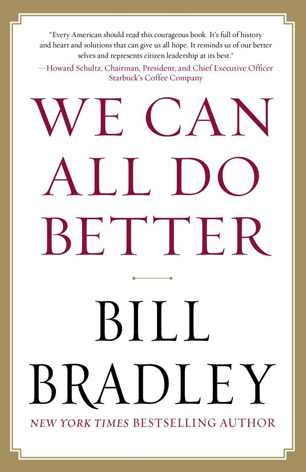Honest, paywall-free news is rare. Please support our boldly independent journalism with a donation of any size.
Dollars deliver messages in a new book by “Dollar Bill” Bradley, and the former Rhodes scholar, NBA star, U.S. Senator and presidential candidate has no doubt where the dollars should and shouldn’t be going. They should be pouring FDR-style into job creation, and they shouldn’t be donated to politicians, especially dollars from corporations.
Bradley’s book, We Can All Do Better, has an early chapter, “Uprooting the Root of All Evil,” that examines the corruption of politics by checkbooks. “At the core of the Washington culture is money,” the chapter begins. “It burdens politicians with the need to raise it. And when they’ve raised it, it compromises them.”
Bradley writes that he spent $1.68 million running for the Senate in 1978. In 2000, running for the same New Jersey seat, Jon Corzine spent more than $62 million, “most of it his own.” While Bradley is scalding about Citizens United, he says the Supreme Court’s wrong-headedness on political donations actually took root in Buckley vs. Valeo in 1976. In that decision “the Court said that the money spent by an individual on his or her own political campaign was political speech, protected under the free-speech clause of the Constitution, and therefore could not be limited. This opened the floodgates for rich people [e.g., Corzine] to finance their own efforts.”
It defies common sense, Bradley says. “In Buckley, the Supreme Court said in effect that it was just fine that the candidate with little money only has a megaphone while the candidate with a lot of money has a microphone.” This laid the groundwork for the corporations-are-people Citizens United ruling, under which “the Supreme Court has approved unlimited contributions by super PACs than can steal elections through widely broadcast lies.”
The black-robed Supreme Court may be clueless and tone-deaf, but ordinary white collar and blue collar workers can easily connect the dots. As Bradley puts it, “There is something fundamentally wrong when a lobbyist—whether representing business or labor—comes to a legislator’s office to plead his client’s case and then four hours later appears at the legislator’s fund-raiser in a nearby restaurant with a $10,000 check. The link between money and policy must be broken.”
What needs to be established (re-established, really) is the link between government spending and job creation: “When it comes to proposed federal action to create jobs, every dollar spent in the current environment of declining confidence in government should go to the establishment of a specific job; people have to see the connection between their tax dollars and job creation….When a government’s credibility has been damaged for whatever reason, it cannot shrink from boldness. It must act in a big way to generate more jobs with a short-term, mid-term and long-term strategy.”
Bradley lays out ideas for all three periods, and he draws on his own childhood to invoke the direct federal job creation that took place under FDR:
“What most people remember about President Franklin Roosevelt’s response to the Great Depression are the Works Progress Administration, the Public Works Administration and the Civilian Conservation Corps, which created jobs for Americans in building schools, parks, roads, dams, bridges. In the small town in Missouri where I grew up, the high school was a PWA project built in 1939. Today, over seventy years later, it stands as a testimony to far-sighted government leadership. We need new public investment in public goods that will last another seventy years….The New America Foundation study estimates that a $1.2 trillion investment in much-needed infrastructure over a five-year period would generate 5.52 million jobs in each year of the program. There is no other stimulus that could create so many jobs and leave behind a seventy-year foundation for economic growth. Given low interest rates, there will never be a cheaper time to float thirty-year reconstruction bonds. Government-subsidized personal consumption (i.e., tax cuts) in the current climate of debt de-leveraging cannot work; public investment that directly creates jobs can.”
Is there any hope for more stimulus spending? For campaign finance reform? It’s hard to imagine the former; as for the latter, it’s easy to imagine but another matter to pull off. Twenty-two state attorneys general, joined by Senators John McCain (R-AZ) and Sheldon Whitehouse (D-OH), have lined up behind a Montana challenge to Citizens United. Bradley’s best-case solution would supersede Buckley and Citizens United with a constitutional amendment “stating that federal, state and local governments can limit the total amount of spending in a political campaign….If that were combined with public financing for whatever amount was permitted by the campaign finance laws, we would have returned government to the people.”
Right now, though, we’re nowhere near returning government to the people; right now we’re heading into the most expensive presidential campaign in U.S. history, bent on handing over government to those with the most dollars.
Press freedom is under attack
As Trump cracks down on political speech, independent media is increasingly necessary.
Truthout produces reporting you won’t see in the mainstream: journalism from the frontlines of global conflict, interviews with grassroots movement leaders, high-quality legal analysis and more.
Our work is possible thanks to reader support. Help Truthout catalyze change and social justice — make a tax-deductible monthly or one-time donation today.
